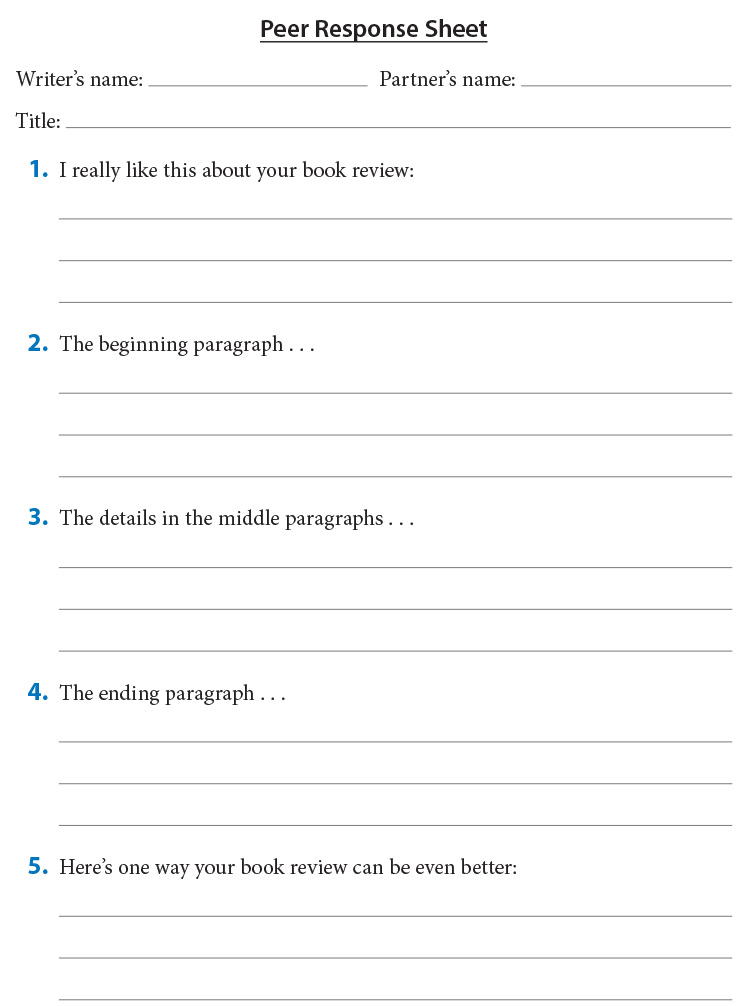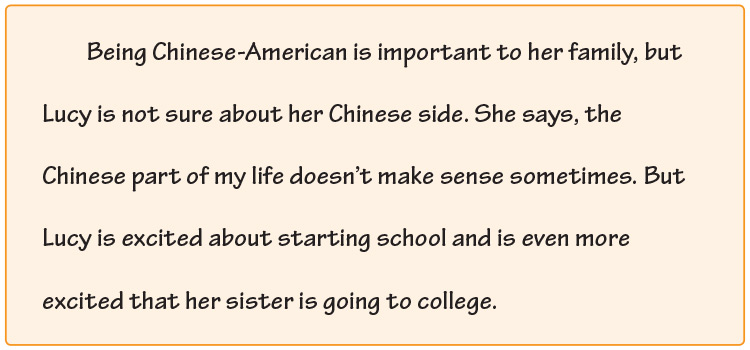Revising Fiction Reviews
Okay, so you've finished your first draft. Great work! What should you do next? First, set it aside for a while. When you return to it, you will be able to read it with fresh eyes. Why is this important? It will help you recognize areas that need improvement. That's the purpose of revising—to make your ideas stronger and easier to follow. The improvement strategies on this page will help you add, cut, and rearrange the writing you've already done.
Revising to Cite Evidence
Citing specific details from the book can help you explain the characters, conflict, and theme. You can make a general idea (purple) stronger or more convincing by adding different types of specific evidence (green).
- Dialogue is something a character says.
- Reasons answer the question why?
- Actions are something a character does.
- Examples provide a specific instance of something.
Marty feels bad about lying to his family. He says, “Funny how one lie leads to another, and before you know it your whole life can be a lie.”
Marty feels sad. He catches Judd kicking Shiloh.
Lucy wants her own space. She builds a wall to split her shared bedroom.
Lucy doesn't feel connected to some Chinese customs. She doesn’t like traditional Chinese food such as octopus and frog.
Teaching Tip
On district and state exams, students will be expected to cite evidence from texts. Use this page as practice.
Cite evidence to support general ideas.
Find and record two general ideas or statements from your book review. Then find evidence from the book to support each idea. Add the evidence to your review. Make a copy of this Google doc or download a Word template.
- General idea:
(Answers will vary.)
Specific evidence:(Answers will vary.)
- General idea:
(Answers will vary.)
Specific evidence:(Answers will vary.)
Revising Paraphrases and Quotations
Whenever you use ideas from someone else's book in your own writing, you need to paraphrase or quote those ideas. Paraphrasing means writing the idea in your own words. Quoting means using the exact words from the book with quotation marks. Read the passage from The Great Wall of Lucy Wu and the sample paraphrase and quote that follow it.
The Chinese part of my life just doesn’t make sense sometimes. Like there are a bunch of women I call ai yi, which means aunt, and when I was little, I thought my mom had a ton of sisters. But they weren’t my real aunts, they were just my mom’s friends.
Paraphrase
Lucy is confused by some Chinese customs, such as why she refers to her mother’s friends as aunts.
Quote
When you use the exact words from a book, you need to put quotation marks around those words. If the quote is followed by a comma or period, put the punctuation inside the end quotation mark.
In The Great Wall of Lucy Wu, Lucy says, “The Chinese part of my life just doesn’t make sense sometimes.”
Teaching Tip
Students should paraphrase ideas more frequently than quoting them. Quotations should be used selectively; the best time to use them is when the author's or character's words are so important that a paraphrase will not do them justice.
Paraphrase and quote.
Practice paraphrasing and quoting using the sample selection. Make a copy of this Google doc or download a Word template.
Glenda of the Giraffe People
by Leslie Fields
Glenda liked to hang around. Literally. Every recess, she hung from the monkey bars until the line of kids barked her down. Then she would hang from the side braces of the swings.
- Paraphrase the passage:
(Answers will vary.) In “Glenda of the Giraffe People,” Glenda hangs on playground equipment for a long time.
- Quote a line or lines from the passage:
(Answers will vary.) Fields says, “Glenda liked to hang around. Literally.”
Revising with a Peer Response
Share your writing.
Have a trusted classmate read your book review and complete this form. Make a copy of this Google doc or download a Word template.

Revising in Action
When you revise, you add, delete, rewrite, and rearrange your writing to make it clearer. Here are some revisions to the book review of The Great Wall of Lucy Wu.
Revise with a checklist.
Read each line. When you can answer each question with a yes, check it off. Make a copy of this Google doc or download a Word template.
Developing Your Ideas
- Do I name the book and the author?
- Do I share information about the main character?
- Do I share information about the conflict?
- Do I identify and explain a theme from the book?
- Do I cite evidence to support general ideas?
- Do I paraphrase and quote ideas correctly?
Structuring Your Ideas
- Does a lead sentence name the title and preview the book?
- Does the beginning paragraph preview what the book is about?
- Do middle paragraphs tell about the characters, conflict, and theme?
- Does the ending paragraph give my recommendation?


